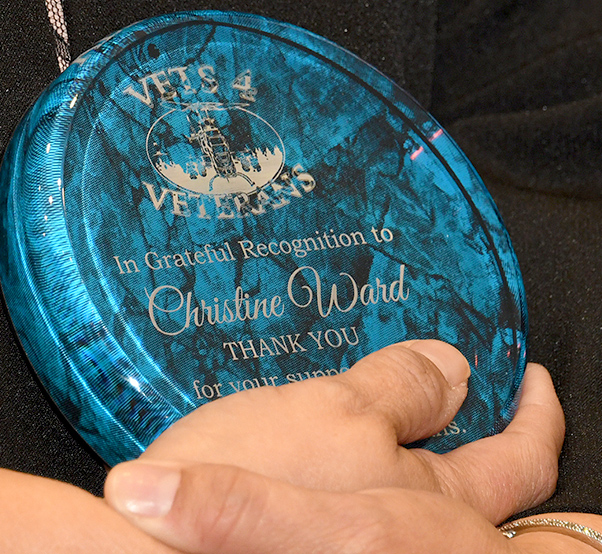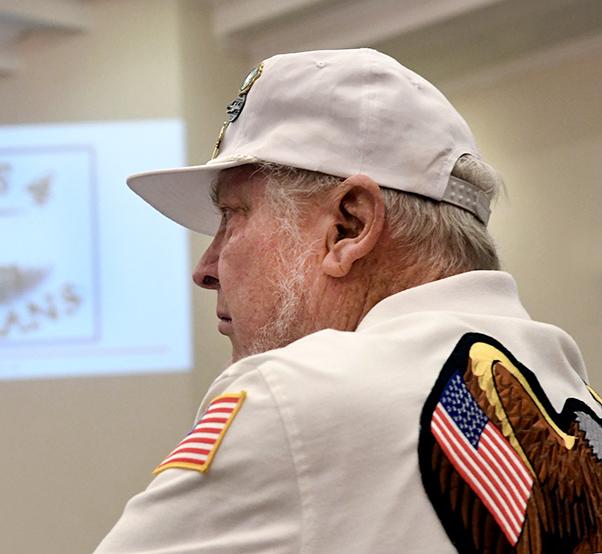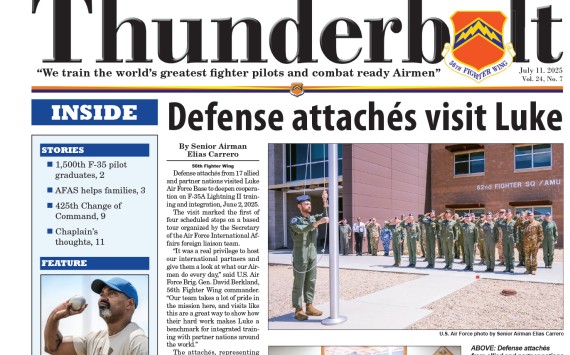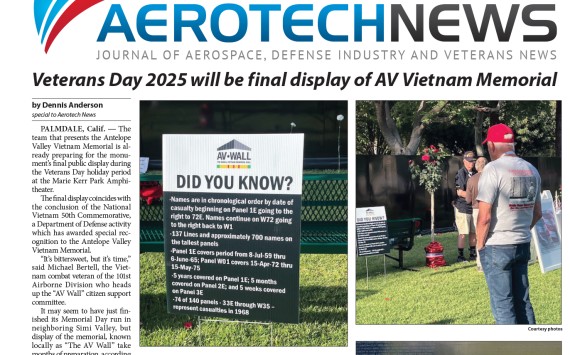LANCASTER, Calif.—The personal, family-style dinner magic that happens at the Vets4Veterans Evening of Community Support is something like a gathering of All Star athletes. You get to meet, mingle with, and hear from heroes. But these are not athletic stars. They are real-life, everyday heroes.
At some point, several years ago, Tom Hilzendeger, the longtime president of the Vets4Veterans non-profit, encountered David Sell. It might seem that their combat and military experiences could not be more different.
Sell was in the Air Force, a field-grade officer, serving on staff in Afghanistan, and a good 20 years younger than Tom. Tom was a draftee, enlisted man, pulled into the Vietnam War, serving with combat engineers attached to the 1st Cavalry Division.
Which is where it starts to get funny, and real. Sell, a perpetually boyish looking 50, was also attached to the 1st Cavalry Division.
On Jan. 31, he shared a bit of his personal history, with hundreds of folks dressed in suits, ties, polo shirts and gowns, all turned out to raise some money to help veterans back from the wars to find their way home.
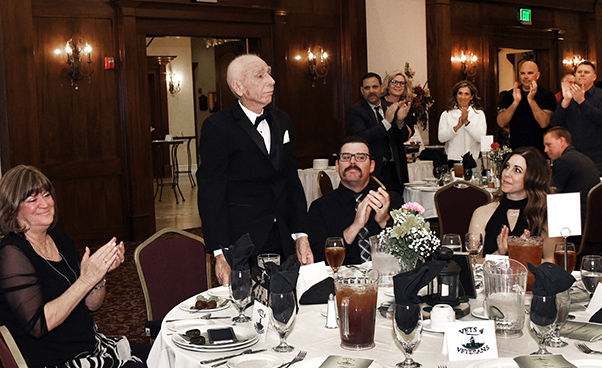
Like most vets, Sell has a few uniforms left. Some are those camouflage utilities, saved for weekend chores. He also has his “Mess Dress” blues, the one with all the medals on it. On Friday night, he wore a simple gray short-sleeve shirt and black slacks, and he wore with him up to the stage the love of his beloved Taryn, who accompanied him at table. He spoke haltingly.
“Everyone in this room has something in common,” he said. “Everyone in this room has a love for someone, a love for something greater than yourself.”
He continued, “We all have pain. All of us have experienced traumatic events, and all of us have been resilient in overcoming these events.
“Some of us get therapy, and I recommend that you do. There are lots of us participating in therapy groups. It can be a HOG Chapter, and that’s a Harley-Davidson Owners Group if you don’t know. It can be Kiwanis, or grief support, or Alcoholics Anonymous, or a church group, or the American Legion, or the VFW, or Disabled American Veterans.”
He recalled that recently, “In the DAV, my group leader asked us to check in and tell our story.”
Sell, a retired lieutenant colonel, then told part of his story to the group of veterans supporters. He told about how the recent helicopter crash that took the lives of Kobe Bryant, his 13-year-old daughter, Gianna, and seven more people, triggered his own memories. For veterans with Post Traumatic Stress Disorder, so-called triggers to memory are a constant companion.
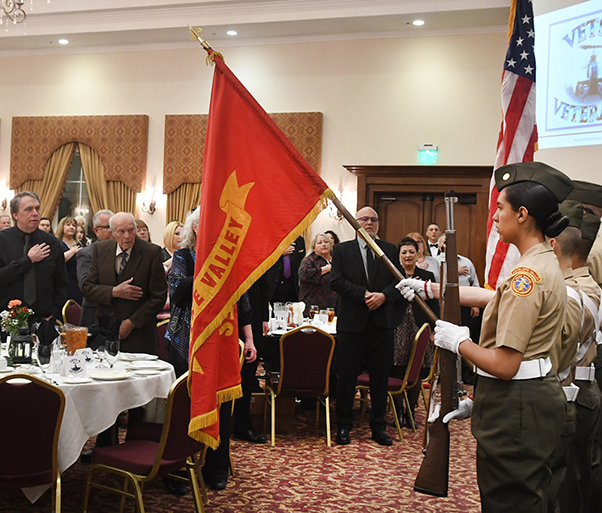
“I heard how there were five lives lost, then nine lives, and I reflected on my own friends and allies lost in helicopter crashes while I was overseas.” He was serving in Afghanistan “when a brother officer got word his brother had just crashed his helicopter.
“I reflected on my own mortality, having flown in Blackhawks, British Puma helicopters and Russian Sikorsky helicopters. There was a British Puma helicopter that crashed right at my base, and my friends who assisted during that crash pulled out the wounded who would never survive, I knew that they would suffer PTSD.”
He added, “They came back to work. They continued to work, they did really well. They finished the mission and they never went home early.”
To the group of veterans, he said, “You all have something in common. You are all warriors who share a love of veterans.”
He recalled how he came back, only to realize the inner demons that tormented him had followed him home, he encountered the “kindness and generosity of Tom Hilzendeger.”
There was Tom. Like another, in another time, he offered shelter from the inner storm.
“It is people like you, Tom,” Sell said, pointing out his friend, and then Tom’s wife. “I thank you, Tom, and you, Megan, for helping me, and lots of veterans.”
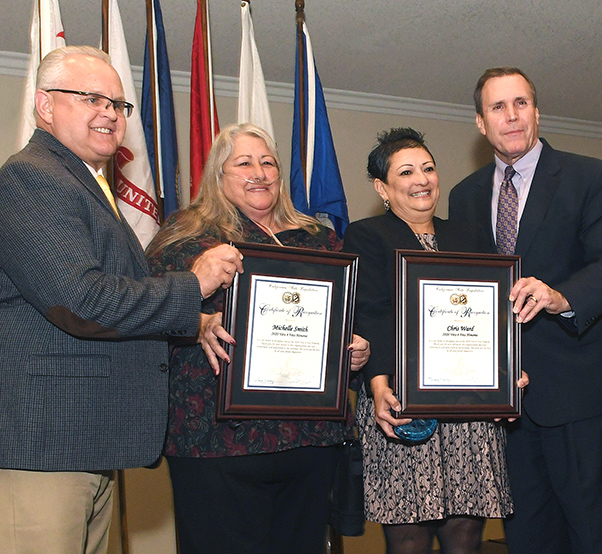
Hundreds of civic-minded folks, many of whom have volunteered or contributed to the local non-profit, rose to their feet in standing ovation for the group’s founder, President Tom Hilzendeger.
Hilzendeger, 70, a plain-spoken Vietnam War veteran, surprised everyone by arriving in a tuxedo, accompanied in formal attire by his wife, Megan, key volunteer and treasurer. It was a change from his usual ball cap and golf course attire.
Palmdale’s mayor, retired firefighter Steve Hofbauer; state legislators Scott Wilk and Tom Lackey; Steve Knight, an Army vet who served in Congress, and J.J. Murphy, Palmdale’s city manager who served in the Air Force, were among those applauding. They joined with hundreds who delivered a sustained round of applause for the man who started a local initiative to help local veterans in need, flowing from a therapy session for survivors of Post Traumatic Stress Disorder.
“Thank you,” Hilzendeger said, waving to the group. “I did not expect this. I love you.”
Hilzendeger got the love right back, with the evening’s invocation provided by Gerry Rice, a brother Vietnam War combat veteran and therapist who facilitated that therapy group more than 10 years ago at the newly established VA Vet Center in Palmdale.
The idea was simple. “If you want to live better with your PTSD, do good things,” Rice, then a VA counselor, advised his combat veterans.
Hilzendeger organized a car show in the VA Vet Center parking lot and they raised a few hundred dollars, that grew to a few thousand in follow-on events like the one Jan. 31 at the Hellenic Center.
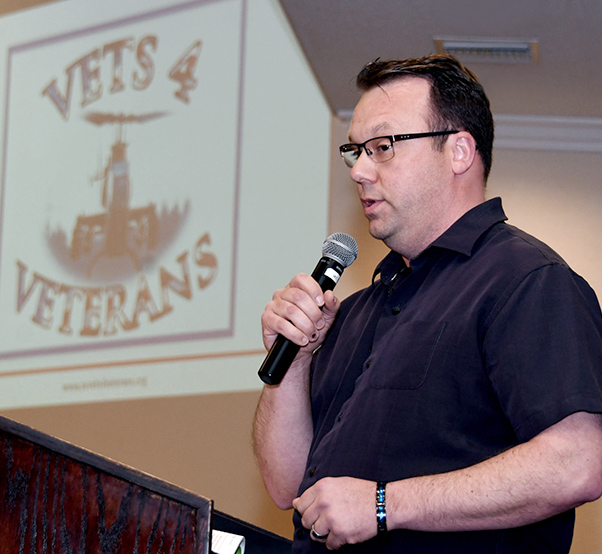
The group became one of the Antelope Valley’s sustaining initiatives to support veterans with emergency needs, groceries, shelter, therapy and scholarships for veterans attending Antelope Valley College. Last year, a dream was realized to open a house that could offer low-to-no cost temporary housing for a veteran family in transition.
On Jan. 31, the group honored two local advocates for veterans, women who have worked steadily and effectively for years on behalf of veterans who are in need of a hand up, rather than a hand out.
The group honored Michelle Smith, a housing outreach specialist for the Military Resource Center, a VA-supported part of Mental Health America of the Antelope Valley. Joining her in the honors was Christine Ward, a veterans advocate in the office of state Sen. Scott Wilk, who began her field work years ago working with Steve Knight, the Army veteran who represented the 25th District in Congress.
Smith recounted how she fell in love with the work of locating veterans, sometimes when they are unhoused and camping in the desert. The joy, she said, is matching them with housing that will help return them to society and greater comfort. “I love my veterans,” she said.
Ward echoed her sentiment, having worked on benefit claims to ease life for entirely too many veterans who fall on hard times after military service.
“I came to love the work, and I never mind taking the calls, sometimes on nights and weekends,” Ward said. “I have the support of my wonderful husband who hears the phone ring, and just says, ‘You better take it!’”
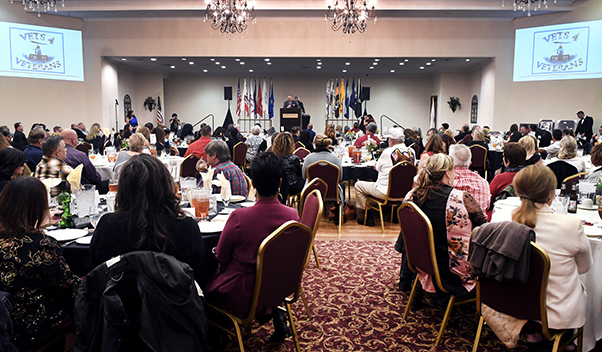
“What I have learned from Vets4Veterans is not to be afraid to tell your story,” Sell said. “I learned, do the things you love, but don’t wait to do them. Don’t wait for retirement. Do them today.”
He continued, “The goal of American soldiers is to provide peace among nations. The goal of American veterans to find peace within. Tom and Megan, thank you for all that you do in supporting veterans.”
Sell’s experience with Vets4Veterans inspired him to become an officer with Disabled American Veterans, helping “veterans to get the benefits they have earned.”
Other participants in the Evening of Community Support included the Young Marines presenting the colors, Nayda Figueroa serving as emcee, with Vets4Veterans Vice President Jack Woolbert and John Parsamyan introducing speakers who represented generations of service.
Conversation sprung up easily, with Vietnam War helicopter crewman Joe Pipkin, 75, discussing combat in the air with World War II veteran Murray Paul Sprunger, 96, a B-17 tail gunner.
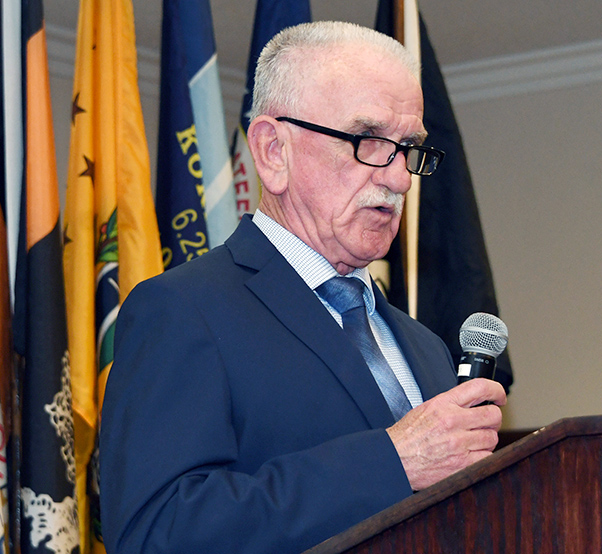
“I did 11 missions,” Sprunger said.
Pipkin, Sprunger, and I all have bum hearing from things that blew up, and machine guns that went off nearby. We leaned in to hear one another better.
“I did get some shots off at an ME-262,” Sprunger said. “Do you know what that is?”
An ME-262 was the Nazi jet fighter, one of the first of its kind: a twin-engine, swept-wing, shark-nosed nightmare for B-17 bomber crews near the end of World War II. “I did 11 missions, and the war ended,” Sprunger said.
And that was how we — Joe, the Vietnam Veteran Huey helicopter crew gunner, me, the Cold War tanker and Iraq War embed, and Murray, the Flying Fortress tail gunner, got off a few words, shouting in each other’s ears at a veterans dinner.
That’s how it is with family.
Editor’s note: Dennis Anderson is a licensed clinical social worker and Army veteran who deployed with National Guard troops as an embedded reporter during the invasion of Iraq in 2003. In his work at High Desert Medical Group he specializes in veterans and community mental health outreach.
